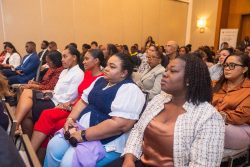Dear Editor,
Today I learnt of the passing of Miriam Makeba, known fondly as ‘Mama Afrika.’ She was an opponent of apartheid who learnt that her passport had been revoked when she tried to return to South Africa for her mother’s funeral in 1960. In 1963, her South African citizenship and right to return to her country were revoked after testifying against apartheid before the United Nations. What a woman, what a life, what sweet music she made. She married Hugh Masekela and later Trinidadian-born civil rights activist and Black Panther Stokely Carmichael, which stirred up controversy and led to her record deals in the US being cancelled.
I realise that many young persons haven’t heard about Miriam Makeba and know very little about apartheid. How times have changed.
I was born in 1965. As a child growing up, I knew a different world. Nelson Mandela was imprisoned. The Caribbean was ruled by colossal leaders, and I mean figuratively speaking − Prime Ministers of the calibre of Forbes Burnham, Errol Barrow, Michael Manley and Eric Williams. These leaders were at the forefront of the anti-apartheid struggle, some more than others.
Burnham was committed to the struggle and refused to allow the English cricket team to play in Guyana in 1981 if Robin Jackman, who had played cricket in South Africa was a member of the team. He did not spare the West Indian great Sir Garfield Sobers from his wrath. Sobers coached and played cricket in Rhodesia and had lunch with then Prime Minister Ian Smith whom he later described as a great man. Burnham insisted that Sobers was not welcome in Guyana until he apologised. The Jamaican government called for his resignation as captain.
In the ’70s, Bob Marley sang War, and pledged to fight “until the philosophy which holds one race superior and another inferior is finally and permanently discredited and abandoned… That until there no longer first class and second class citizens of any nation, until the colour of a man’s skin is of no more significance than the colour of his eyes… And until the ignoble and unhappy regimes that hold our brothers in Angola, in Mozambique, South Africa, sub-human bondage have been toppled, utterly destroyed… We Africans will fight till we find it necessary and we know we shall win, as we are confident in the victory of good over evil.”
In 1976, Guyana boycotted the 1976 Olympics along with some African nations after the refusal of the IOC to ban New Zealand after their national rugby union team had toured South Africa earlier in 1976. South Africa had been banned from the Olympics since 1964 because of its apartheid policies. Burnham stood on principle though it was felt that James Wren Gilkes would win gold in the 200m. A lot more than a gold medal was at stake.
How the world has changed.
Nelson Mandela was released from prison in 1990 and became South Africa’s first black President in 1994 in their first multi-racial election. The United Cricket Board in South Africa was established in 1991 and this brought about the organizational unity of all cricketers in South Africa after a century of segregation, discrimination and division.
On November 4, 2008, the world watched as Barack Obama became the first African American to be elected President of the United States of America. It was clear that tens of millions of Americans were able to vote their interests regardless of the candidate’s skin colour.
I wonder if in my dear land of Guyana voting would ever transcend race, since, I too, like Dr Martin Luther King, have a dream.
Yours faithfully,
Dawn A Holder





